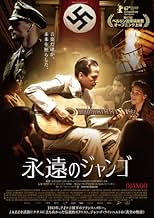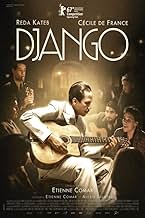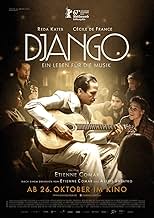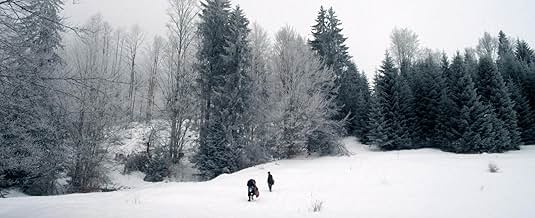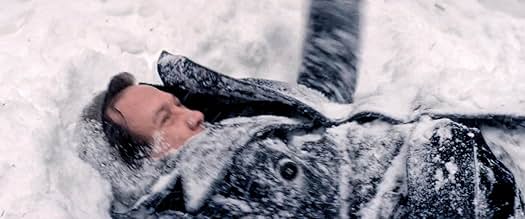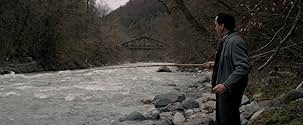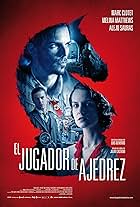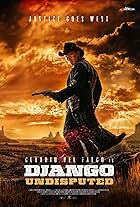IMDb RATING
6.4/10
2.1K
YOUR RATING
The story of Django Reinhardt, famous guitarist and composer, and his flight from German-occupied Paris in 1943.The story of Django Reinhardt, famous guitarist and composer, and his flight from German-occupied Paris in 1943.The story of Django Reinhardt, famous guitarist and composer, and his flight from German-occupied Paris in 1943.
- Awards
- 5 nominations total
Cécile de France
- Louise de Klerk
- (as Cécile De France)
Bea Palya
- Naguine Reinhardt
- (as Beata Palya)
Gabriel Mirété
- Lévêque
- (as Gabriel Mireté)
- …
Etienne Timbo Mehrstein
- Timbo Hoffman
- (as Etienne Mehrstein)
Featured reviews
A splendid gripping film, released on the day we Dutch honor all those who have fallen during the 2nd World War. The captivating acting and the way in which the film was shot, immerses you in and meanders you along a distressing part of Django Reinhardt's life. The spellbinding music in the film, paying homage to Django Reinhardt's innovative jazz with an infusing Gypsy flavor, will stay with you for the rest of your life. And if you ever have the good fortune to visit the chapel of Saint-Pierre in Villefrance-sur- Mer (France) and look at the details of the wall paintings by Jean Cocteau, you will realize what a big impact Django has made on lots of people.
Django. Director/Writer Etienne Comar (primarily a Producer "Of God and Men" 2010) brings forth yet another amazing untold story about the German occupancy, this time set in Paris. This poignant music filled production chronicles the life of gypsy musician Django Reinhardt (Red Kateb "Zero Dark Thirty" 2012). When Django (who became a renown European Jazz and Gypsy Swing aficionado) and his band "Hot Quintet" is hired to entertain Nazi's in Germany, at a time when Jazz, the Blues and certain percussion instruments and musical beats were forbidden, the event turns hostile and soon his family and friends are forbidden to live their encampment, the young are forced to join the resistance, and soon he flees for his life. Comar starts the film with camera work that is too jumpy and too close to its characters to understand what and why things are happening. However, once he abandons this format, and steps back and establishes the environment (beautiful cinematography by Christophe Beaucarne) and begins to tell the story, the film gains its footing and never lets go. The musical presentation (music by Warren Ellis) in this film, especially the final concert, are mesmerizing and not to be missed. I don't know if Kateb actually performed the various guitar arrangements, but if he did, his performance is to be rewarded. Supporting Django in a successful minor role is his wife Naguine (Bea Playa), his mother Negros (Bombay Merstein) with her spirited personality, his resistance lover Louise de Klerk (Cecile De France) and his various bandmates. I have to say, I was not initially sold on this film. However, when the story of survival presented itself, set against the beautiful music and harsh realities of the WWII Nazi occupancy, I couldn't help but become fully invested in the presentation. This film was screened at the Palm Springs International Film Festival #PSIFF2018
Too schematic and for non-French wiever also not 100% understandable ... German soldiers presented as too stupid.
This film covers mostly 1943 as well as a bit in May, 1945 at the end. So, obviously this film is not Django Reinhardt's entire life story. It's a shame but I can certainly understand why they chose this path. If you want to know more about the man, check Wikipedia and go from there.
The film picks up in the middle of WWII. Django is a big star in Paris and is even loved by the occupying Nazis. What makes this so unusual is that he was one of the Romani (aka Gypseys) and they were hated and persecuted by the Reich. Additionally, he played swing...a style music associated with black Americans...a group also despised by the German government. Problems develop when the Nazis insist he do a tour of Germany and Django is worried he'll never return. So, they decide to make a run for it. The movie is all about this period of time.
The film is something I really appreciated because tons of films have been done about the Jewish Holocaust. These are excellent films but the Romani were also gassed in large numbers and I can't think of a single film that covers it other than this one. It makes for a sad viewing experience...but also a masterfully crafted one well worth your time.
The film picks up in the middle of WWII. Django is a big star in Paris and is even loved by the occupying Nazis. What makes this so unusual is that he was one of the Romani (aka Gypseys) and they were hated and persecuted by the Reich. Additionally, he played swing...a style music associated with black Americans...a group also despised by the German government. Problems develop when the Nazis insist he do a tour of Germany and Django is worried he'll never return. So, they decide to make a run for it. The movie is all about this period of time.
The film is something I really appreciated because tons of films have been done about the Jewish Holocaust. These are excellent films but the Romani were also gassed in large numbers and I can't think of a single film that covers it other than this one. It makes for a sad viewing experience...but also a masterfully crafted one well worth your time.
World Premier at Berlin film festival, Feb. 9, 2017. Django Reinhardt was one of the most brilliant pioneers of European jazz and the father of Gypsy Swing. "Django" portrays one chapter in the musician's eventful life and is a gripping tale of survival. Constant danger, flight and the atrocities committed against his family could not make him stop playing.
Rarely is an opening festival film so compelling and overwhelming that you feel as if the festival ended right there the trip to Berlin would have been justified. Reda Kateb as Django Reinhardt the gypsy musician with the German sounding name, made me forget I was watching an actor playing a part but felt like I was watching the jazz legend Django himself back from the great beyond in the flesh, carefully trimmed Gable moustache and all. This film like last year's Jazz Legend Berlin biopic "Miles Ahead" (Miles Davis) assumes that the audience knows the personality in question well enough not to require any back story and plunges right into a certain segment of the life under scrutiny. In actual fact, while Three fingered guitarist Django Reinhardt was highly regarded by black American Jazzmen such as Duke Ellington, Ornette Coleman, et alia, because his name is mainly associated with the french "Le Hot" jazz scene of the thirties and forties, he is not as well known to the general American public as he should be. Django was simply a musical genius whose hot jazz quintet was the hottest band around in France and surrounding countries up to and including the German occupation years of WW II. This film focuses on two things: The incredible music of Django with half a dozen virtuoso foot stomping musical sequences, and (2) the persecution of Gypsies under Nazi racism. The musical sections show in great detail the fantastic guitar fingerings of the inimitable Django as well as his backup musicians, notably the clarinetist who was also jamtastic.
A German officer who is a great fan of Django's lines up a German tour for the Hot Quintet to entertain Nazi bigwigs in Germany. However there are restrictions that must be met supposedly removing all Black Jazz elements such as the Blues and certain percussion instruments deemed as racially impure by the Nazis. Django finally realizing that if he goes on the tour he will probably never return flees with his feisty mother and family south hoping to make it over the border to Switzerland and safety. Apprehended there he is forced to stage a concert for a group of high level Nazis at a luxurious lakeside villa, but the heat of Djangos hot jazz drives the Germans into a Frenzy and results in a riot. Django escapes in the confusion and survives the war. At the very end after France is liberated a Requiem he composed to honor the Exterminated Gypsies is played on a momentous church organ and Django's heroism is recognized. A final message on screen notifies us that all but the opening bars of Django's requiem were lost, but have been reconstructed by serious musicians to prove that Reinhardt was not only a virtuoso performer but a noteworthy composer as well. Magnificent, beyond words. Cécile de France was also captivating as Django's fictionalized Gadjo (Non-Gypsy) girlfriend who marries a Nazi to save her own life but risks it at the end to save Django, and the old woman who plays Django's mother is a scene stealer every time she appears. Director Étienne Comar has done both the film and music worlds a great service with this remarkable picture.
PS: By no means to be confused with Q. Tarantino's comic book entitled "Django Unchained" under penalty of death!
Rarely is an opening festival film so compelling and overwhelming that you feel as if the festival ended right there the trip to Berlin would have been justified. Reda Kateb as Django Reinhardt the gypsy musician with the German sounding name, made me forget I was watching an actor playing a part but felt like I was watching the jazz legend Django himself back from the great beyond in the flesh, carefully trimmed Gable moustache and all. This film like last year's Jazz Legend Berlin biopic "Miles Ahead" (Miles Davis) assumes that the audience knows the personality in question well enough not to require any back story and plunges right into a certain segment of the life under scrutiny. In actual fact, while Three fingered guitarist Django Reinhardt was highly regarded by black American Jazzmen such as Duke Ellington, Ornette Coleman, et alia, because his name is mainly associated with the french "Le Hot" jazz scene of the thirties and forties, he is not as well known to the general American public as he should be. Django was simply a musical genius whose hot jazz quintet was the hottest band around in France and surrounding countries up to and including the German occupation years of WW II. This film focuses on two things: The incredible music of Django with half a dozen virtuoso foot stomping musical sequences, and (2) the persecution of Gypsies under Nazi racism. The musical sections show in great detail the fantastic guitar fingerings of the inimitable Django as well as his backup musicians, notably the clarinetist who was also jamtastic.
A German officer who is a great fan of Django's lines up a German tour for the Hot Quintet to entertain Nazi bigwigs in Germany. However there are restrictions that must be met supposedly removing all Black Jazz elements such as the Blues and certain percussion instruments deemed as racially impure by the Nazis. Django finally realizing that if he goes on the tour he will probably never return flees with his feisty mother and family south hoping to make it over the border to Switzerland and safety. Apprehended there he is forced to stage a concert for a group of high level Nazis at a luxurious lakeside villa, but the heat of Djangos hot jazz drives the Germans into a Frenzy and results in a riot. Django escapes in the confusion and survives the war. At the very end after France is liberated a Requiem he composed to honor the Exterminated Gypsies is played on a momentous church organ and Django's heroism is recognized. A final message on screen notifies us that all but the opening bars of Django's requiem were lost, but have been reconstructed by serious musicians to prove that Reinhardt was not only a virtuoso performer but a noteworthy composer as well. Magnificent, beyond words. Cécile de France was also captivating as Django's fictionalized Gadjo (Non-Gypsy) girlfriend who marries a Nazi to save her own life but risks it at the end to save Django, and the old woman who plays Django's mother is a scene stealer every time she appears. Director Étienne Comar has done both the film and music worlds a great service with this remarkable picture.
PS: By no means to be confused with Q. Tarantino's comic book entitled "Django Unchained" under penalty of death!
Storyline
Did you know
- TriviaAll music played by the incredible Dutch Rosenberg Trio
- ConnectionsFeatures Schichlegruber - Doing the Lambeth Walk (1941)
- SoundtracksNuages
Music by Django Reinhardt
- How long is Django?Powered by Alexa
Details
- Release date
- Country of origin
- Official sites
- Languages
- Also known as
- Джанго
- Filming locations
- Production companies
- See more company credits at IMDbPro
Box office
- Gross US & Canada
- $56,556
- Opening weekend US & Canada
- $11,722
- Jan 7, 2018
- Gross worldwide
- $3,876,874
- Runtime1 hour 57 minutes
- Color
- Aspect ratio
- 2.35 : 1
Contribute to this page
Suggest an edit or add missing content


![Watch Bande-annonce [OV]](https://m.media-amazon.com/images/M/MV5BMDc0Zjk3YzgtYTBmZC00MDI5LTg1MjItZjBjMGEyMzI3ODc2XkEyXkFqcGdeQXRodW1ibmFpbC1pbml0aWFsaXplcg@@._V1_QL75_UX500_CR0,0,500,281_.jpg)


